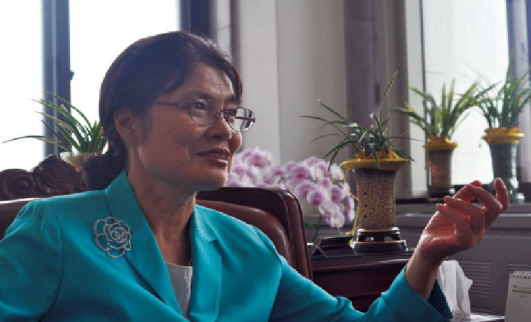“I couldn’t face away their pain. My conscience led me to participate.”

In 1978 when violation and poor working condition for female workers were nothing more than a social norm, Dong-il Corportaion overstepped the boundary and threw excremental water to female workers who proclaimed for better working conditions. Female workers, who couldn’t overlook such violation of human rights, held the protest in nude to avoid being hauled by the police. In the center of the protest was Choi Young-hee (‘73, Sociology) who is now a member of the Assembly, and head of Gender, Equality and Family Committee.
“Reading books in a comfortable library at Ewha felt like a life of a carefree princess living in the castle. When I saw the miserable lives of Korean female workers, I couldn’t face away their pain. My conscience led me to participate in the labor movement,” she said.
The situation of female workers was beyond her imagination. In a textile company where she led the labor movement, the factory maintained high humidity and temperature to keep textile in good condition. Female labors had to struggle in 38 degrees for more than ten hours a day, bearing the heat lash. Sexual harassments and physical assaults were also common.
Founding the Naeil Shinmoon, a daily newspaper, in 1993, she realized that not only the workers in the nation but the whole public needs to be awake and acknowledge their rights to promote democracy in Korea.
“One third of the paper readers were ordinary women who got married and had kids. If those women didn’t understand their rights, no development in democracy or women rights was possible,” she said.
Since then, she opened Naeil Women’s Center and started free sex education as well as teenager education. She wishes that someday, average women in Korea be enlightened and make their own voice as a learned and respectable civil like mothers in other developed nations.
“Until now, housewives were regarded as the easiest target to cajole for government. In western countries no politician can ignore housewives easily since they are aware of their rights. I hope and believe Korean housewives will someday be recognized as powerful group,” she said.
Choi remembers the lecture she heard from Constantin Virgil Gheorghiu, the author of novel Vingt-cinquième Heure, which changed her entire life.
“We should always sense the minor problems of the society and sacrifice ourselves to let people recognize it.”
“Before the technology developed, people used to put rabbits in the bottom of the submarine. Since rabbits are very sensitive, they respond to minor movements of the ship by getting hurt or killed,” she said. “The intellectuals of the society should be like rabbits. We should always sense the minor problems of the society and sacrifice ourselves to let people recognize it.”
She hopes students at Ewha would continue their role as female intellectuals of Korean society as their seniors did to improve women’s rights.
“Every member of Ewha should make their voices to social issues. Voting on election days or calling a broadcasting station to complain their improper television program can all be a valuable movement,” she said.

